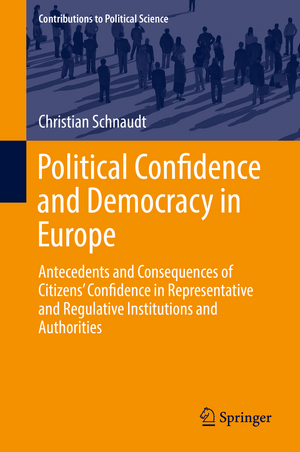Political Confidence and Democracy in Europe: Antecedents and Consequences of Citizens’ Confidence in Representative and Regulative Institutions and Authorities: Contributions to Political Science
Autor Christian Schnaudten Limba Engleză Hardback – 18 iul 2018
| Toate formatele și edițiile | Preț | Express |
|---|---|---|
| Paperback (1) | 728.11 lei 6-8 săpt. | |
| Springer International Publishing – 2 feb 2019 | 728.11 lei 6-8 săpt. | |
| Hardback (1) | 734.09 lei 6-8 săpt. | |
| Springer International Publishing – 18 iul 2018 | 734.09 lei 6-8 săpt. |
Din seria Contributions to Political Science
- 18%
 Preț: 724.17 lei
Preț: 724.17 lei - 24%
 Preț: 633.39 lei
Preț: 633.39 lei - 17%
 Preț: 524.54 lei
Preț: 524.54 lei - 15%
 Preț: 583.61 lei
Preț: 583.61 lei -
 Preț: 380.63 lei
Preț: 380.63 lei - 15%
 Preț: 471.69 lei
Preț: 471.69 lei - 18%
 Preț: 780.82 lei
Preț: 780.82 lei - 18%
 Preț: 785.86 lei
Preț: 785.86 lei -
 Preț: 379.86 lei
Preț: 379.86 lei - 15%
 Preț: 695.85 lei
Preț: 695.85 lei -
 Preț: 390.84 lei
Preț: 390.84 lei - 18%
 Preț: 777.50 lei
Preț: 777.50 lei -
 Preț: 387.75 lei
Preț: 387.75 lei - 18%
 Preț: 791.71 lei
Preț: 791.71 lei -
 Preț: 394.29 lei
Preț: 394.29 lei - 15%
 Preț: 635.15 lei
Preț: 635.15 lei -
 Preț: 381.42 lei
Preț: 381.42 lei - 18%
 Preț: 798.66 lei
Preț: 798.66 lei -
 Preț: 392.37 lei
Preț: 392.37 lei -
 Preț: 391.02 lei
Preț: 391.02 lei -
 Preț: 359.76 lei
Preț: 359.76 lei - 18%
 Preț: 788.90 lei
Preț: 788.90 lei -
 Preț: 387.58 lei
Preț: 387.58 lei -
 Preț: 395.47 lei
Preț: 395.47 lei - 20%
 Preț: 579.41 lei
Preț: 579.41 lei - 15%
 Preț: 643.34 lei
Preț: 643.34 lei -
 Preț: 384.86 lei
Preț: 384.86 lei -
 Preț: 487.57 lei
Preț: 487.57 lei - 18%
 Preț: 781.62 lei
Preț: 781.62 lei - 15%
 Preț: 645.79 lei
Preț: 645.79 lei - 15%
 Preț: 698.62 lei
Preț: 698.62 lei -
 Preț: 396.62 lei
Preț: 396.62 lei - 15%
 Preț: 584.26 lei
Preț: 584.26 lei - 18%
 Preț: 727.80 lei
Preț: 727.80 lei -
 Preț: 393.35 lei
Preț: 393.35 lei - 15%
 Preț: 651.84 lei
Preț: 651.84 lei
Preț: 734.09 lei
Preț vechi: 895.23 lei
-18% Nou
Puncte Express: 1101
Preț estimativ în valută:
140.53€ • 146.63$ • 117.80£
140.53€ • 146.63$ • 117.80£
Carte tipărită la comandă
Livrare economică 12-26 martie
Preluare comenzi: 021 569.72.76
Specificații
ISBN-13: 9783319894317
ISBN-10: 3319894315
Pagini: 366
Ilustrații: XXII, 302 p. 12 illus.
Dimensiuni: 155 x 235 mm
Greutate: 0.63 kg
Ediția:1st ed. 2019
Editura: Springer International Publishing
Colecția Springer
Seria Contributions to Political Science
Locul publicării:Cham, Switzerland
ISBN-10: 3319894315
Pagini: 366
Ilustrații: XXII, 302 p. 12 illus.
Dimensiuni: 155 x 235 mm
Greutate: 0.63 kg
Ediția:1st ed. 2019
Editura: Springer International Publishing
Colecția Springer
Seria Contributions to Political Science
Locul publicării:Cham, Switzerland
Cuprins
Introduction: Political Confidence and Democracy.- The Concept of Political Confidence.- Antecedents of Political Confidence.- Consequences of Political Confidence.- Conclusions: The Distinctiveness and Relevance of Different Conceptions and Types of Political Confidence.
Notă biografică
Christian Schnaudt is a research fellow at GESIS – Leibniz Institute for the Social Sciences in Mannheim, Germany. Prior to that, he worked as a research associate and lecturer at the Department of Political Science at the University of Mannheim, Germany. His research interests are in the area of political behaviour and comparative politics, including topics such as political confidence and trust, political participation, and democratic norms and values. His research has been published in the European Journal of Political Research, The Journal of Information Technology & Politics, and methods, data & analyses.
Textul de pe ultima copertă
This book examines the antecedents and consequences of citizens’ confidence in different political institutions and authorities. Its main argument states that a distinction between confidence in representative and regulative institutions and authorities is of crucial importance in order to gain novel insights into the relevance of political confidence for the viability of democratic systems. Relying on individual-level data from the European Social Survey (ESS), the author provides empirical evidence that citizens from a total of twenty-one European countries make a distinction between confidence in representative institutions and authorities and confidence in regulative institutions and authorities. Furthermore, the author shows that both types of political confidence emanate from different sources and are associated with varying consequences. Overall, these findings indicate that confidence in representative and confidence in regulative institutions and authorities establish two qualitatively different types of political confidence, each with distinct implications for the functioning and well-being of modern democracies.
Caracteristici
Investigates the distinctiveness, antecedents and consequences of citizens’ confidence in representative and regulative institutions and authorities Offers an in-depth analysis of citizens’ political confidence for a total of twenty-one European countries based on individual-level data from the European Social Survey (ESS) Provides novel insights into the relevance of citizens’ political confidence for the functioning and well-being of modern democracies
